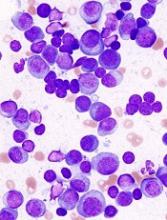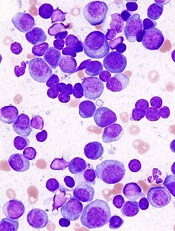User login
Preclinical research suggests an AKT inhibitor could be effective against multiple myeloma (MM).
The inhibitor, HS1793, is a derivative of the antioxidant compound resveratrol.
Investigators found that HS1793 decreased AKT signaling to induce mitochondria-mediated cell death in MM cells.
HS1793 was cytotoxic to MM cells in a mouse model of human metastatic myeloma and in human MM cells in vitro.
Jin Han, MD, PhD, of Inje University in Busan, South Korea, and colleagues reported these results in Cancer Letters.
“AKT is frequently activated in MM cells, and the incidence of AKT activation correlates positively with disease activity,” the authors noted.
They had screened 400 compounds and identified HS1793 as the most promising AKT inhibitor. Experiments suggested that HS1793 inhibits AKT activation by interfering with the interaction between AKT and its promoter, HSP90.
HS1793 exhibited antimyeloma activity in human MM cell lines. The investigators said this appeared to be from a dose-dependent effect that allowed for mitochondria-mediated programmed cell death.
In additional experiments, the team found that HS1793’s inhibition of AKT/HSP90 interaction results in cell death by suppressing NF-κB signaling. HS1793-induced cell death was caused by the direct inhibition of AKT that, in turn, suppressed NF-κB activation.
The investigators found that HS1793 “dramatically decreased” lytic skull and femur lesions in a mouse model of MM metastatic to bone. And mice that received HS1793 had superior survival, when compared to mice that received vehicle control.
The investigators also showed that HS1793 was cytotoxic to MM cells but not normal plasma cells isolated from patients with MM.
“Given that HS1793 treatment specifically induced the death of primary and relapsed MM cells, HS1793 offers excellent translational potential as a novel MM therapy,” the authors wrote.
This research was supported by grants from the Korean government. The investigators reported no potential conflicts of interest.
Preclinical research suggests an AKT inhibitor could be effective against multiple myeloma (MM).
The inhibitor, HS1793, is a derivative of the antioxidant compound resveratrol.
Investigators found that HS1793 decreased AKT signaling to induce mitochondria-mediated cell death in MM cells.
HS1793 was cytotoxic to MM cells in a mouse model of human metastatic myeloma and in human MM cells in vitro.
Jin Han, MD, PhD, of Inje University in Busan, South Korea, and colleagues reported these results in Cancer Letters.
“AKT is frequently activated in MM cells, and the incidence of AKT activation correlates positively with disease activity,” the authors noted.
They had screened 400 compounds and identified HS1793 as the most promising AKT inhibitor. Experiments suggested that HS1793 inhibits AKT activation by interfering with the interaction between AKT and its promoter, HSP90.
HS1793 exhibited antimyeloma activity in human MM cell lines. The investigators said this appeared to be from a dose-dependent effect that allowed for mitochondria-mediated programmed cell death.
In additional experiments, the team found that HS1793’s inhibition of AKT/HSP90 interaction results in cell death by suppressing NF-κB signaling. HS1793-induced cell death was caused by the direct inhibition of AKT that, in turn, suppressed NF-κB activation.
The investigators found that HS1793 “dramatically decreased” lytic skull and femur lesions in a mouse model of MM metastatic to bone. And mice that received HS1793 had superior survival, when compared to mice that received vehicle control.
The investigators also showed that HS1793 was cytotoxic to MM cells but not normal plasma cells isolated from patients with MM.
“Given that HS1793 treatment specifically induced the death of primary and relapsed MM cells, HS1793 offers excellent translational potential as a novel MM therapy,” the authors wrote.
This research was supported by grants from the Korean government. The investigators reported no potential conflicts of interest.
Preclinical research suggests an AKT inhibitor could be effective against multiple myeloma (MM).
The inhibitor, HS1793, is a derivative of the antioxidant compound resveratrol.
Investigators found that HS1793 decreased AKT signaling to induce mitochondria-mediated cell death in MM cells.
HS1793 was cytotoxic to MM cells in a mouse model of human metastatic myeloma and in human MM cells in vitro.
Jin Han, MD, PhD, of Inje University in Busan, South Korea, and colleagues reported these results in Cancer Letters.
“AKT is frequently activated in MM cells, and the incidence of AKT activation correlates positively with disease activity,” the authors noted.
They had screened 400 compounds and identified HS1793 as the most promising AKT inhibitor. Experiments suggested that HS1793 inhibits AKT activation by interfering with the interaction between AKT and its promoter, HSP90.
HS1793 exhibited antimyeloma activity in human MM cell lines. The investigators said this appeared to be from a dose-dependent effect that allowed for mitochondria-mediated programmed cell death.
In additional experiments, the team found that HS1793’s inhibition of AKT/HSP90 interaction results in cell death by suppressing NF-κB signaling. HS1793-induced cell death was caused by the direct inhibition of AKT that, in turn, suppressed NF-κB activation.
The investigators found that HS1793 “dramatically decreased” lytic skull and femur lesions in a mouse model of MM metastatic to bone. And mice that received HS1793 had superior survival, when compared to mice that received vehicle control.
The investigators also showed that HS1793 was cytotoxic to MM cells but not normal plasma cells isolated from patients with MM.
“Given that HS1793 treatment specifically induced the death of primary and relapsed MM cells, HS1793 offers excellent translational potential as a novel MM therapy,” the authors wrote.
This research was supported by grants from the Korean government. The investigators reported no potential conflicts of interest.

